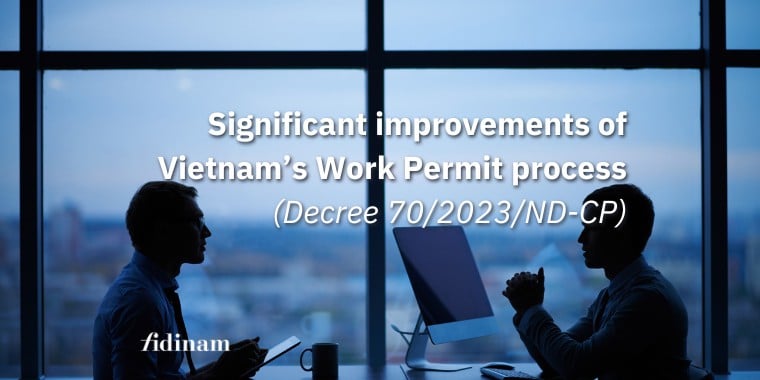
In a significant move to streamline and adapt its workforce regulations, the Vietnamese government has issued Decree 70/2023/ND-CP, marking a pivotal shift in the landscape for foreign workers in Vietnam.
This landmark decree introduces vital amendments and supplements to existing regulations, indicating a new era of opportunities and flexibility for international professionals and businesses operating within the country. It aims to foster a more dynamic and globally integrated workforce, reflecting Vietnam's commitment to evolving in step with the changing global work environment.
In this article, we delve into the key facets of Decree 70/2023/ND-CP, unpacking how these changes stand to redefine the professional terrain for foreign workers in Vietnam.
The most recent changes to the regulations specify that, to be categorized as an "Expert" role, the individual must hold at least a Bachelor's degree, potentially in a field related or unrelated to the expected job scope. Additionally, they must also have a minimum of three years of relevant experience for the role. This represents a shift from the previous criteria, which mandated that both the degree and the three years of experience needed to be directly aligned with the job role or assignment.
For instance, under the new regulations, an individual in a “Marketing” role could satisfy the educational requirement with an MBA, rather than needing a specialised “Marketing degree” as previously required.
Foreign technical workers are also exempted from the requirement to work in the specialised field they are trained in. Instead, they only need to be trained for at least one year and have at least three years of working experience appropriate to the expected job position in Vietnam.
Previously, the title "CEO" was limited to individuals leading a company's subsidiary units, despite the absence of a clear definition for the term "dependent unit." The updated regulations have broadened and provided clarity on this scope. According to the revised guidelines, a CEO is now defined as either:
In addition, the new regulations provide a clear list of documents for foreigners working as experts or executive directors. The supporting documents include:
The need to deploy foreign workers across multiple locations throughout Vietnam is common for many businesses. Under the previous regulations, only one work location could be officially recorded on a work permit, limiting the flexibility of foreign workers. However, Decree 70 aligns with the Labor Code and allows businesses and employees to freely agree upon multiple work locations and record them in labour contracts. Specifically, when foreign employees work in different locations for an enterprise, the enterprise is required to list these work locations on their work permit application. Furthermore, when foreign employees work in various provinces and centrally run cities, the enterprise must report this to the competent authority through the online system within three working days from the commencement of employment.
Starting from January 1, 2024, businesses are required to publicly advertise their intention to recruit Vietnamese workers before seeking foreign workers. This must be done through the electronic information portal of the Ministry of Labor, War Invalids and Social Affairs or the employment service centre established by the Chairman of the Provincial People's Committee.
In addition to these key changes, Decree 70 also reduces the reporting time to explain the need to employ foreign workers from a minimum of 30 days, as stated in Decree 152, to just 15 days.
In the previous regulations, only one extension of the Work Permit was allowed, and any subsequent applications were regarded as new applications, requiring the submission of all documents as if it were an entirely new application. However, the revised regulations have introduced a simplification in this process. After a single extension, if an employee intends to maintain the same position, the re-application process is now more straightforward compared to a fresh application, notably excluding the need for Criminal Records and experience documentation. This marks a substantial enhancement in the overall Work Permit renewal process.
Before employing foreign workers, employers (except contractors) shall carry out procedures to determine the need to use foreign workers for each job position that Vietnamese workers have not met the need and report to competent authorities. The deadline set for this procedure according to the new regulations is at least 15 days in advance of the expected date of employing foreign workers, while the old regulations required reporting 30 days in advance.
During the implementation process, if there is any change in the need for position, title, form of work, quantity, or location of work, the employer shall report to competent authorities at least 15 days in advance from the expected date of using foreign workers (previously 30 days).
In conclusion, as the Vietnamese government takes strides towards a more globally integrated and flexible workforce with Decree 70/2023/ND-CP, navigating these changes can be both exciting and challenging for businesses and foreign professionals.
To ensure seamless compliance and make the most of these new opportunities, partnering with a knowledgeable corporate services provider is key. Fidinam has extensive experience in Vietnam and is ideally positioned to guide you through these regulatory changes.
Whether you're looking to expand your business in Vietnam, hire foreign talent, or understand the implications of these new regulations for your operations, Fidinam offers expert advice and tailored solutions.
Contact us via the form below or at info@fidinam.com.vn.
All content © . All Rights Reserved.